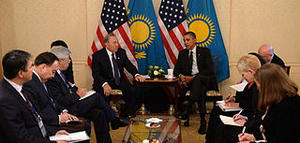Nuclear security U.S.-Russian nuclear security cooperation victim of growing bilateral tensions
One of the greatest benefits brought about by the end of the cold war was the agreement been the United States and the former Soviet republics to cooperate closely in securing the large, and not-always-well-protected, Soviet nuclear stocks. The 1991 Cooperative Threat Reduction agreement, aka the Nunn-Lugar program after the two former senators — Sam Nunn [D-Georgia] and Richard Lugar [R-Indiana]) — who persuaded fellow lawmakers to fund it, has facilitated to achievement of important security measures: dismantling of thousands of nuclear warheads, securing facilities in Russia where weapon-grade material is stored, and finding suitable jobs for tens of thousands of Russian nuclear scientists, engineers, and technicians. More than two decades of cooperation in guarding weapons-grade stockpiles have now come to an end, the result of tensions over Russia’s role in Ukraine. Experts say the end of U.S.-Russia nuclear cooperation leaves the world “a more dangerous place.”

President Obama conferring with Navarayev of Khszakistan // Source: commons.wikimedia.org
One of the greatest benefits brought about by the end of the cold war was the agreement been the United States and the former Soviet republics to cooperate closely in securing the large, and not-always-well-protected, Soviet nuclear stocks.
The 1991 Cooperative Threat Reduction agreement, aka the Nunn-Lugar program after the two former senators — Sam Nunn [D-Georgia] and Richard Lugar [R-Indiana]) — who persuaded fellow lawmakers to fund it, has facilitated to achievement of important security measures: The Guardian reports that 900 intercontinental ballistic missiles were destroyed, and over 7,600 nuclear warheads were deactivated. Some 250 tons of bomb-grade fissile material, warehoused in many locations in the former Soviet Union, was secured and placed under tight monitoring so corrupt officials would not be able to sell it to the highest bidder. Moreover, tens of thousands of former Soviet nuclear weapons scientists, engineers, and technicians were helped in finding suitable jobs with good salaries to make it less likely that they would be tempted to offer their know-how to terrorist groups or rogue states.
This successful security program is now under threat.
Vladimir Putin has not been coy in expressing his irritation with the premise that Russia was not able on its own to keep its nuclear materials safe, and hinted that the program was not much more than a cover for a U.S. espionage effort aimed to keep a close eye on Russia’s nuclear secrets. In 2012 Moscow announced it would not extend Nunn-Lugar, but a year later the United States and Russia worked out a bilateral nuclear security arrangement as a replacement.
The scope of that deal – which is part of the framework of the Multilateral Nuclear Environment Program in Russia (MNEPR) — was more modest. The Guardian notes that under MNEPR, the United States would no longer participate in the process of dismantling of nuclear weapons, but would continue to offer help in securing stocks of fissile plutonium and uranium.
Even this more modest arrangement has now been killed. In December, Congress, as part of its response to the Russian involvement in the war in Ukraine, voted to cut funding for it, although lawmakers said that unspent money in the program could still be used. The Russians, though, have had enough. The Boston Globe reported that a few days after the vote in Congress, Russian officials told their American counterparts that Russia would cut off nearly all cooperation with the United States on nuclear security issues.
The result is that no U.S.-funded security work will be done at any Russian nuclear weapons sites, and there will not be any joint security upgrades at any Russian facility where weapons-grade nuclear material are kept.
Sam Nunn told the Guardian that “the world is a less safe place because of this”:
There has been a race between cooperation and catastrophe, when you look at the possibility of catastrophic acts of terrorism. Cooperation has been running rapidly over the past twenty years, but this is a real setback…The Russians says they are going to spend resources to secure their materials and we have to hope they will. They have the expertise to do it, but they are under heavy economic pressure.
Matthew Bunn, a Harvard University professor and an expert on the issue, said: “Nuclear security is dramatically better than it was in the 1990s. The question now is how much those improvements will be sustained. Will there sufficient protection against insiders? Because all thefts up to now have been by insiders, not twenty guys coming in from the outside with guns blazing.”
As to the growing tensions between the United States and Russia, tensions to which the Nunn-Lugar program fell victim, Bunn said: “It makes the world a more dangerous place. It will make it more likely there will be nuclear security incidents in the world’s biggest nuclear stockpile.”
